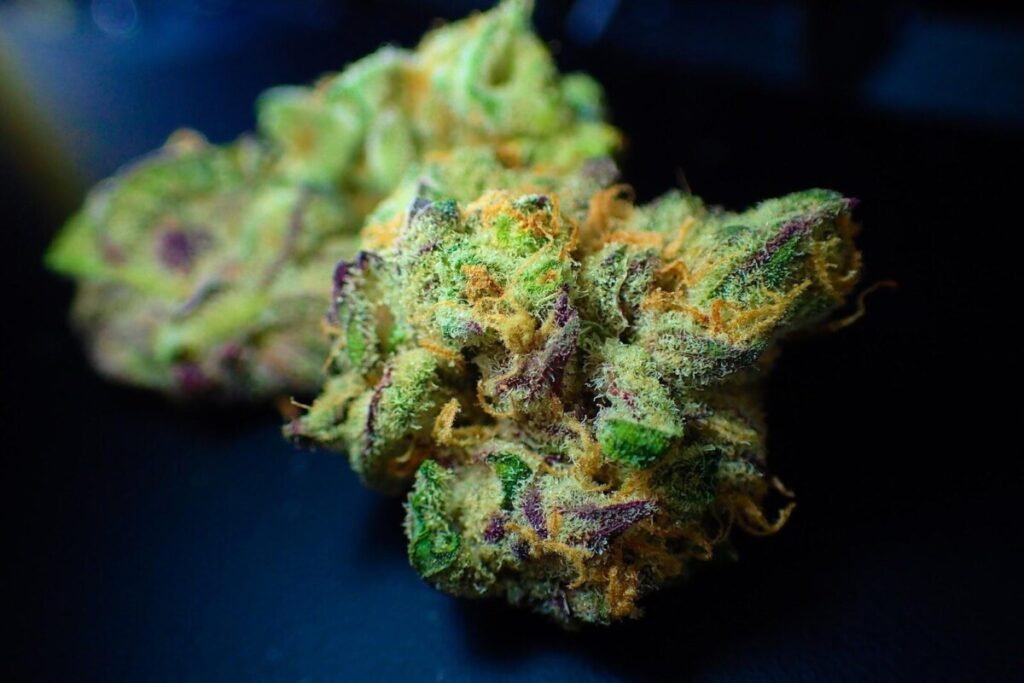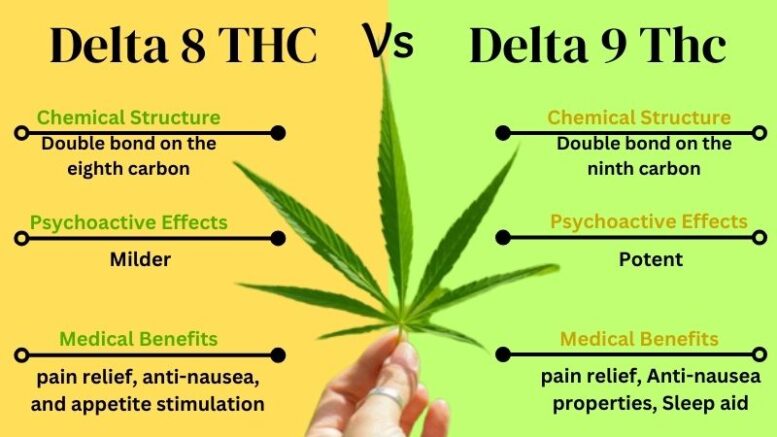The cannabis industry is increasingly focused on two cannabinoids: Delta-8 THC and Delta-9 THC. Each has distinct properties and effects that are stirring both interest and debate. This article examines the differences between Delta-8 and Delta-9 THC, their benefits, risks, and the legal frameworks governing them. Delta-9 THC has been extensively studied for nearly 60 years, but Delta-8 THC has received less research focus.
Regulation varies significantly between these compounds. Delta-9 THC, where legal is subject to stringent testing, extraction, and labeling rules. Conversely, Delta-8 THC production often needs to have these strict standards, potentially leading to issues like impurities in products or labeling inaccuracies. In this article, we will explain in detail about- Delta-8 THC vs. Delta-9 THC, its benefits, side effects, legal status, and many more.
What Is Delta-8 THC?
Delta-8 THC, a relatively lesser-known member of the cannabis cannabinoid family, is increasingly gaining attention for its distinct characteristics. It differs chemically from its more famous relative, Delta-9 THC. This difference results in a less intense psychoactive effect, which is attractive to those seeking the advantages of THC without the powerful high that Delta-9 THC typically produces.
Originating primarily from hemp plants, Delta 8 THC undergoes a synthesis process that lowers its potency relative to Delta-9 THC. Despite this reduced potency, it still effectively engages with the body’s endocannabinoid system, offering users a balanced and milder experience.
As Delta-8 THC becomes more prevalent in the market, its varied applications, such as in oils, edibles, and vapes, are attracting a diverse user base. People are turning to Delta-8 THC not only for recreational purposes but also for its potential therapeutic benefits, such as anxiety reduction and pain relief.
Potential Benefits of Delta 8 THC
Delta-8 THC, a cannabinoid from cannabis, is known for its milder high compared to Delta-9 THC, attracting users for its reduced anxiety and enhanced focus. This subtler psychoactive effect makes it an appealing alternative for therapeutic use. Delta-8 THC has shown potential in pain management, appealing to those with chronic pain conditions.
It also exhibits antiemetic properties, reducing nausea and vomiting, a significant benefit for chemotherapy patients. Additionally, its appetite-stimulating effects offer crucial support for individuals experiencing appetite loss due to medical treatments.
- Milder High: Offers a gentler and clearer psychoactive experience than Delta-9 THC, suitable for those seeking benefits without intense effects.
- Stress and Anxiety Relief: Known to help reduce stress and anxiety, providing a calming and relaxing effect.
- Pain Relief: Effective in alleviating various types of pain, beneficial for individuals with chronic pain issues.
- Appetite Stimulation: Stimulates appetite, helping those who need to increase food intake, such as patients undergoing specific medical treatments.
- Nausea Reduction: Exhibits anti-nausea properties, beneficial for chemotherapy patients or others experiencing nausea.
- Improved Sleep: Assists in enhancing sleep quality, potentially aiding those with insomnia or sleep disturbances.
Potential Risks of Delta 8 THC
Delta-8 THC, while offering several benefits, also comes with its own set of potential risks and side effects. Delta-8 THC, while beneficial, carries risks primarily due to its psychoactive nature. Users may experience dizziness, anxiety, and varying psychoactive effects, especially at higher doses or initial use.
Psychoactive Effects:
- Milder High: Although less potent than Delta-9 THC, Delta-8 still produces psychoactive effects, which can include mild euphoria, alterations in sensory perception, and in some cases, feelings of anxiety or confusion.
Physical Side Effects:
- Dry Mouth and Eyes: Common with many THC products, users might experience dryness in the mouth and eyes.
- Dizziness: Some users report feeling dizzy or lightheaded after using Delta-8 THC, especially at higher doses.
What Is Delta-9 THC
Delta-9 THC is the primary psychoactive component in cannabis, known for creating a strong ‘high.’ It differs from its less potent cousin, Delta-8 THC, in its intensity and effects. When consumed, Delta-9 THC interacts with the brain, altering mood, perception, and sensation, often leading to a state of relaxation and euphoria.
It’s more powerful than Delta-8, making it popular for recreational use and potential therapeutic benefits. Medical research has explored Delta-9 THC for relieving chronic pain and nausea, particularly in chemotherapy patients.
However, due to its potency, users should approach Delta-9 THC with caution, as it can also cause anxiety or paranoia at higher doses, contrasting with the milder experiences associated with Delta-8 THC.
Potential Benefits of Delta 9 THC
It effectively reduces severe nausea and vomiting, common side effects of chemotherapy, and helps stimulate appetite, addressing the critical issue of weight loss during cancer treatment.
This aspect of Delta-9 THC can be particularly beneficial, improving the overall quality of life for patients. Moreover, research suggests potential benefits of Delta-9 THC in neurological disorders
In terms of mental health, Delta-9 THC has shown potential in alleviating symptoms of anxiety and depression in some users, though responses can vary. There’s also emerging evidence of its utility in treating certain neurological disorders.
While it offers these benefits, mindful and responsible use of Delta-9 THC is essential due to its psychoactive properties.
Potential Risks of Delta 9 THC
Delta-9 THC, while beneficial for some, also carries potential risks and side effects. A few Potential Risks are discussed below:
Intense Psychoactive Effects:
- Strong ‘High’: Can cause an overpowering sense of euphoria or altered mental state.
- Anxiety and Paranoia: In some users, particularly at high doses, it may induce anxiety or paranoid thoughts.
Physical Side Effects:
- Dryness in Mouth and Eyes: A common sensation of dryness is often felt in the mouth and eyes by many users.
- Dizziness: Mild headaches or a feeling of dizziness can occur in some individuals.

Delta-8 THC vs Delta-9 THC: Key Differences
The differences between Delta-8 THC and Delta-9 THC ( Delta-8 THC vs. Delta-9 THC) is based on their chemical structure, effects, and user experience:
1. Chemical Structure:
- Delta-8 THC: Has a double bond on the eighth carbon in its molecular structure. This slight variation impacts how it binds with the endocannabinoid system in the body, leading to different effects.
- Delta-9 THC: Features a double bond on the ninth carbon in its molecular structure. This slight difference significantly alters its interaction with the body’s cannabinoid receptors compared to Delta-8 THC.
2. Psychoactive Effects:
- Delta-8 THC: Generally produces a milder psychoactive effect. Users often report a more clear-headed experience, with reduced anxiety and greater focus.
- Delta-9 THC: Known for its potent psychoactive effects, often resulting in a more intense ‘high.’
3. Medical Benefits:
- Delta-8 THC: Shown potential in pain relief, anti-nausea, and appetite stimulation with less psychoactivity, making it a preferable choice for some medical patients.
- Delta-9 THC: More widely studied for medical use, particularly effective in treating chronic pain, severe nausea, and stimulating appetite in chemotherapy patients.
4. User Experience:
- Delta-8 THC: Users often choose Delta-8 for a smoother, less overwhelming experience. It’s sought after for its ability to provide relaxation and pain relief without the intense high.
- Delta-9 THC: Preferred by users seeking a more robust and immediate psychoactive experience. Its stronger effects are favored for recreational use and by patients needing more potent symptom relief.
Are Delta-9 Stronger Than Delta-8 THC?
Delta-9 THC is typically more potent than Delta-8 THC in both strength and impact. The variance lies in their molecular structures, influencing their effects on the endocannabinoid system. Delta-9’s heightened potency results in a more powerful psychoactive experience, often associated with significant changes in mood, perception, and cognition.
In General, Delta-8 THC, with its less potent nature, delivers a milder and more manageable ‘high.’ Users often describe it as less intense and clearer-headed compared to Delta-9 THC. Additionally, Delta-9 THC may induce stronger physical and mental reactions, including heightened sensory perception and altered time perception, while Delta-8 THC is generally associated with fewer adverse effects, making it a preferred option for those seeking THC benefits with a lower risk of anxiety and paranoia.
Can Delta-8 Show Up on a Drug Test?
Various drug tests exist, and some detect any type of cannabinoid, including Delta-8 THC, since it belongs to the cannabinoid family. There are also tests specifically targeting THC, primarily Delta-9 THC.
Delta-8 THC may still result in a positive test for THC since it is chemically identical to Delta-9 THC and is converted into similar molecules in the body. New drug tests designed to detect Delta-8 THC specifically are being developed with the widespread availability of over-the-counter drugs containing this THC. This is particularly relevant for individuals undergoing new drug testing or who might use Delta-8 THC as a loophole.
Are Delta-8 THC and Delta-9 THC Legal?
The legal status of Delta-8 THC and Delta-9 THC is complex and varies significantly depending on geographical location and specific legislation:
1. Delta-9 THC:
- Federal Legality: In the United States, Delta-9 THC is classified as a Schedule I drug under the Controlled Substances Act, making it federally illegal.
- State Laws: Several states have legalized or decriminalized Delta-9 THC for medical and/or recreational use.
- International Perspective: Globally, the legality of Delta-9 THC varies widely, with some countries allowing its use for medical purposes while others have strict prohibitions.
2. Delta-8 THC:
- Federal Legality: Delta-8 THC is in a legal gray area in the U.S. It’s technically legal at the federal level if derived from hemp containing less than 0.3% Delta-9 THC, as per the 2018 Farm Bill.
- State Regulations: Despite federal legality, some states have explicitly banned or restricted the use and sale of Delta-8 THC, citing safety and regulatory concerns.
- Regulatory Ambiguity: The legality of Delta-8 THC is subject to ongoing debates and potential future regulation, making its legal status uncertain and subject to change.
Both compounds’ legal statuses are influenced by ongoing discussions around cannabis and hemp, public perception, and regulatory changes.
FAQs on Delta 8 and Delta 9 thc
Does delta-8 take longer to kick in than delta-9?
The onset time for Delta-8 THC can vary depending on the method of consumption. However, it generally has a similar onset time to Delta-9 when consumed in similar forms (like gummies). Individual metabolism also plays a role in how quickly these compounds take effect. What happens if you take too much delta 8?
Does delta 9 increase anxiety?
Delta-9 THC can increase anxiety in some individuals, especially at higher doses. It’s known for its potent effects, which can include heightened anxiety and paranoia in sensitive users. What not to take with Delta-9?
Will delta-9 get you higher than delta-8?
Yes, Delta-9 is stronger than delta-8. So, it will give you more high than delta-8.
Can you take delta-8 and delta-9 at the same time?
Yes, but be careful; they are strong, and mixing them can be too intense for some. It is better to take it separately.
What happens if you take too much delta 8?
If you take too much, you will feel a headache, dry mouth, dizziness, and many more symptoms.
What not to take with Delta-9?
It’s best not to mix Delta-9 with alcohol or other drugs that can make you drowsy or slow down your thinking, as it can make these effects stronger.
Wrap it up
In our exploration of “Delta-8 THC vs. Delta-9 THC: What’s The Key Differences?” We delved into the nuances of Delta-8 and Delta-9 THC. We uncovered their distinct chemical compositions, effects, and user experiences.
While Delta-8 THC offers a milder, more controlled high, Delta-9 THC is known for its stronger, more intense effects. We also discussed their legal status, which varies widely, and their potential benefits, ranging from pain relief to anxiety reduction.
The potential side effects and risks associated with each were highlighted, alongside their detection in drug tests. This comprehensive overview underscores the importance of informed usage and understanding of the unique aspects of these compounds in the cannabis world.
